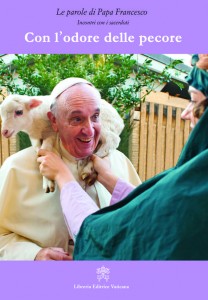
Pope Francis: With the Smell of the Sheep
“My name is Julius: what do you like best about being Pope?”
“What I like, sincerely, is being a parish pastor.”
Julius’ question, and Pope Francis’ response, were taken from the pontiff’s dialogue with some members of the Evangelical Lutheran Church of Rome, Sunday, November 15, 2015; from it we can see, as if it weren’t already obvious, that Pope Francis “likes being a pastor-style Pope,” that he “likes being a shepherd.”
Everyone still remembers vividly the homily given March 28, 2013 by the newly-elected Pope, “who had come from the ends of the earth” – just 15 days after his first appearance on the Loggia of Benedictions – in which he invited priests to be pastors who “smelled like their sheep” when caring for their souls.
This definition has become part of history and current jargon for describing how a priest needs to act, if he wants to be a true shepherd. With the Smell of the Sheep is now also the title of this collection (232 pages, €14.00) of the words that Pope Francis has spoken to priests, from his first Chrism Mass as Bishop of Rome till now. This book, edited by Giuseppe Merola, is part of the Words of Pope Francis collection, and the Vatican Publishing House has published it to mark the Jubilee for Priests, held at the Vatican on June 1.
In his homily at that Chrism Mass, with few, essential words, the pontiff outlined the profile of a priest “according to God’s heart.” The Pope feels that “our people like it when the Gospel we preach touches their daily lives, when it runs down like Aaron’s oil, down to the edges of reality, when it brings light to the outskirts.” This is why it is necessary for the priest to go out, first of all from his own self, and reach his flock, where there is “suffering, bloodshed, blindness that longs for sight” and where there are “prisoners in thrall to many evil masters.”
In formulating this invitation, the Pope was reminding priests that “it is not precisely through soul-searching, nor in constant introspection, that we encounter the Lord.” By doing that, there is the risk that “we minimize the power of grace, which is activated and grows in the measure in which we, with faith, go out to make a gift of ourselves and to give the Gospel to others, to give that small amount of anointing that we have to those who have none of it at all.”
Both in his response to young Julius and in the 2013 Chrism Mas, Francis gives the reason for his choosing to “be” a shepherd: because it gives him joy! And in thinking about this, we are immediately reminded of an image – we might say the icon of this Pope, if not of his entire papacy – in which a smiling and joyous Francis holds a lamb on his shoulders during his visit to a Roman parish, that of St. Alphonsus Liguori, on January 6, 2014.
They are shepherds, therefore, with God’s love and joy; never being “sad priests.” Whenever the pontiff speaks to a group of priests, or if he refers to the priestly ministry in any talk, he stresses the sense of sadness that, unfortunately, down through his years as a Jesuit priest and, later, as bishop, he has encountered in many men of God. Most recently, while meeting with participants in the Convention promoted by the Congregation for the Clergy on November 20, 2015, he said, “It isn’t normal for a priest to often be sad, tense, irritable or hard of character; this isn’t right, and it does no good for the priest or his people.” He then concluded saying, “We priests are apostles of joy: we proclaim the Gospel, which is the ‘good news’ par excellence.” This is because Pope Francis is convinced that “a priest who is at peace with himself will be able to diffuse serenity around him, even in his most trying moments, transmitting the beauty of a relationship with God.”
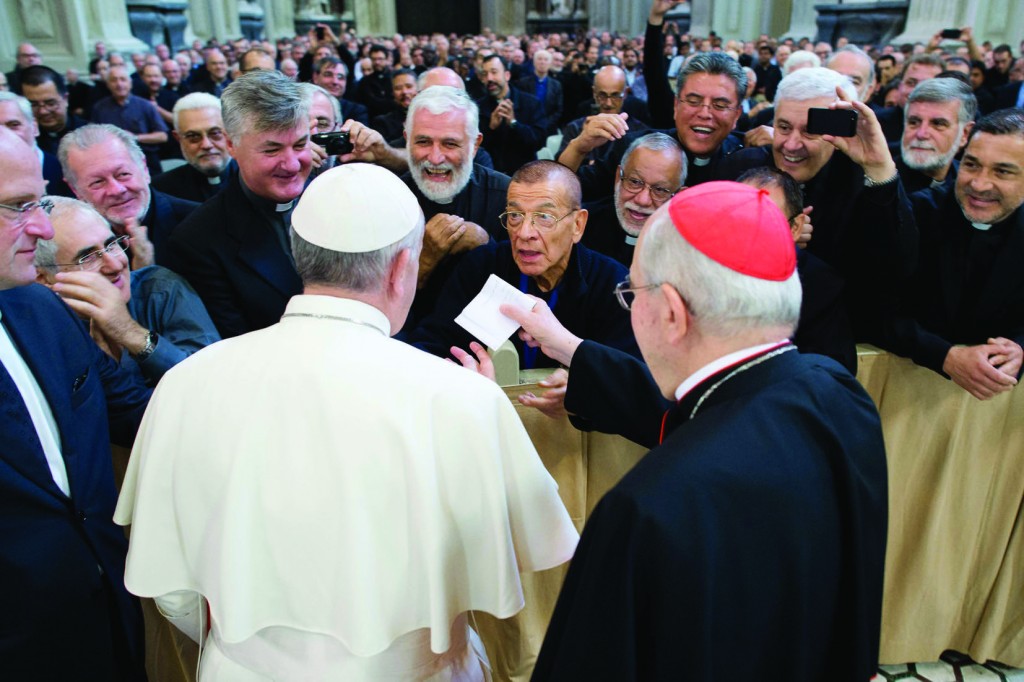
Pope Francis is greeted by priests of the Diocese of Rome during his visit to the Basilica of St. John Lateran in Rome September 16. At right is Cardinal Agostino Vallini, papal vicar for Rome. (CNS photo/L’Osservatore Romano via Reuters)
Without a doubt, pastoral service is often exhausting, and priests have to divide their energies among multiple commitments, some of which are hardly in line with their mission but which seem to fall more into the job description of a public employee.
The Pope realizes this. At the Chrism Mass in 2015, he made reference to this: “The weariness of priests! Do you know how often I think about this; how tired you all are? I think about it a lot, and I pray about it, too, especially when I am the one feeling tired. I pray for you who work amidst God’s faithful people who have been assigned to you, many in very abandoned and dangerous places.” But the Pope reminds us all to be aware that “our tiredness, dear priests, is like incense that ascends silently up to Heaven. Our fatigue goes straight to the Father’s heart.”
This book is a collection of all the speeches and talks that Pope Francis has given to date to priests, or concerning the figure of the priest. It ranges from the homilies pronounced during Chrism Masses to talks given to priests in the dioceses he visited as part of his apostolic journeys; from his speeches to the Roman Curia, to those addressed to the bishops during their ad limina visits; from priest-related topics mentioned during his Angelus addresses, to speeches made to the Congregations of Bishops and the Clergy; included are even his talks on the formation of seminarians, and his words to victims of sexual abuse at the hands of priests.
Through his words, Pope Francis reminds every priest that it is necessary to keep feeling like a true disciple on life’s entire journey, aware that “at times we go along at a quick pace, other times our steps are unsure, we stop and we may even fall, but we always remain on the path.” (Speech to the Plenary Meeting of the Congregation for the Clergy, October 3, 2014)
This is a path that, in this Jubilee year, every priest-pilgrim will be undertaking under the merciful gaze of the Supreme Pastor.

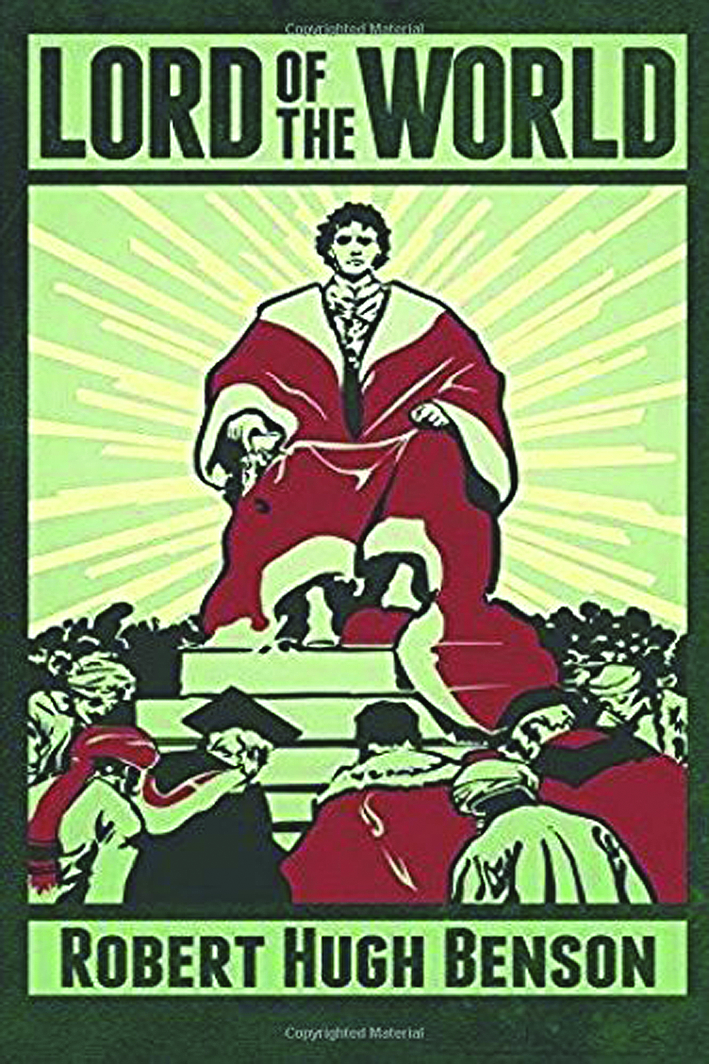
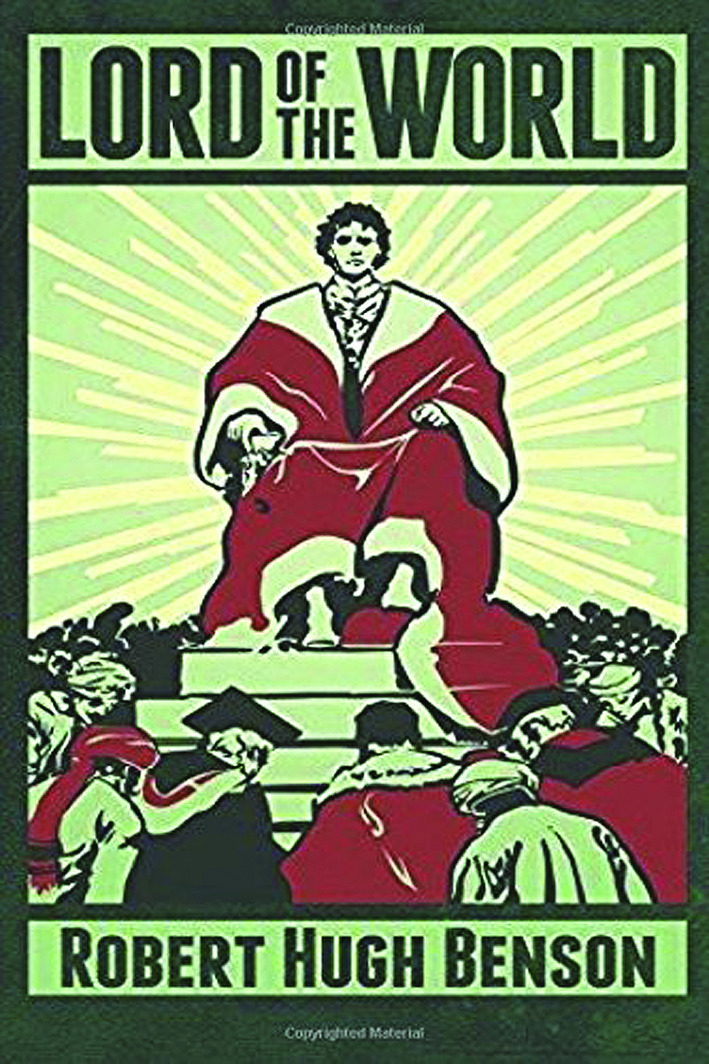
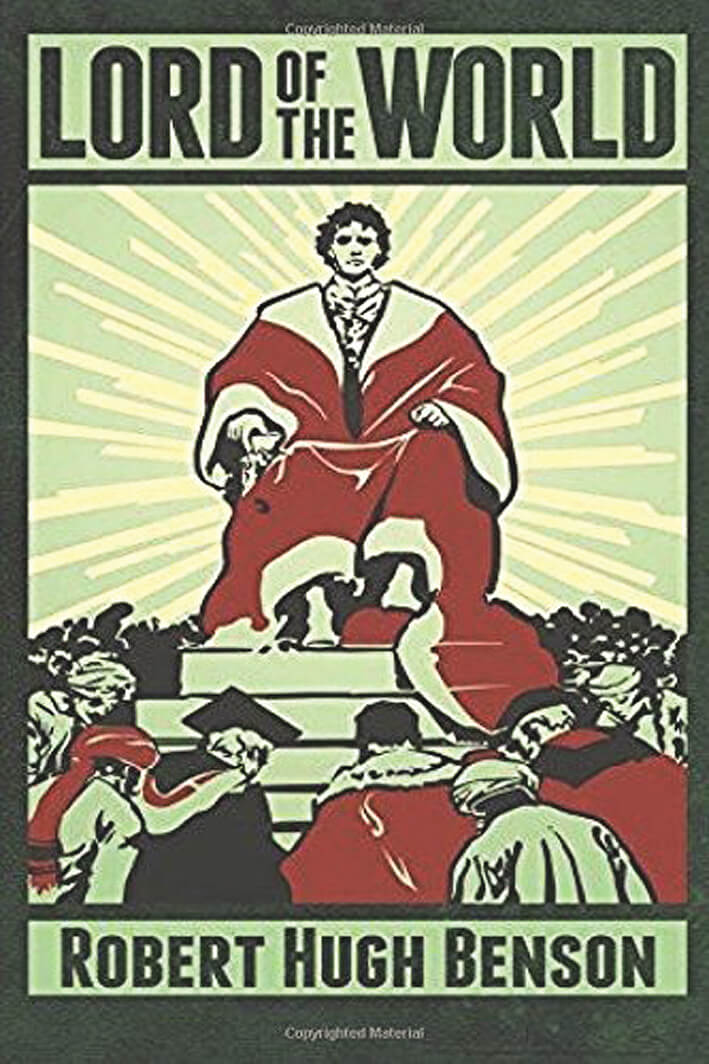
Facebook Comments